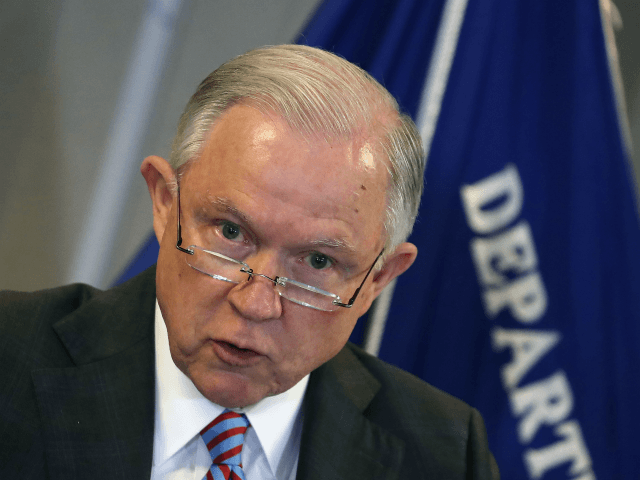Attorney General Jeff Sessions’ Department of Justice (DOJ) responded late Monday to a lawsuit by Deputy Director Leandra English of the Consumer Financial Protection Bureau (CFPB) to block President Donald Trump’s appointment of Mick Mulvaney as acting director of the CFPB, making a compelling case as to why the president’s appointment is valid, the English’s lawsuit is a frantic attempt by an Obama holdover to keep CFPB under the control of DC’s Swamp.
Hours before Richard Cordray resigned on November 24 as director of the CFPB to run for Ohio governor, he promoted English, his like-minded liberal chief of staff to the position of deputy director. He did this so that a liberal Democrat agenda created by President Barack Obama for controlling the banking industry and financial service sector would continue for at least several additional months while a new director when through the nomination and confirmation process.
But before Cordray’s resignation, President Trump invoked his authority under the Federal Vacancy Reform Act of 1998, which empowers him to name an acting officer to Senate-confirmed offices when there is a vacancy. He named White House Budget Director Mulvaney to serve as the acting director of CFPB for however many months it takes the president to nominate a permanent director, and for the Senate to confirm that nominee.
Sessions’ Office of Legal Counsel (OLC) at DOJ issued a legal memorandum that carefully explored the relevant statutes, and concluded that President Trump has authority under the VRA to appoint an acting director if the current director resigns. The general counsel of CFPB, Mary McLeod, agreed with that assessment, issuing a memo to all CFPB staff informing them that Mulvaney is the lawful head of their agency.
English responded by suing Sunday night in U.S. District Court for the District of Columbia, seeking a court order that she is in charge of CFPB. The agency—which was the brainchild of Sen. Elizabeth Warren (D-MA)—was created by the Dodd-Frank Act, which specifies that the deputy director shall “serve as acting Director in the absence or unavailability of the Director.”
Cordray made it clear as he resigned that he deliberately promoted English during his last day on the job so that he could do an end-run around President Trump and guarantee that CFPB would continue to advance the Obama-Warren-Cordray agenda. English claimed in the lawsuit that his resignation makes him “absent” and “unavailable,” thus triggering this successor provision in Dodd-Frank.
English seeks a temporary restraining order (TRO)—an extremely rare measure—ordering President Trump to embrace her as the head of the agency, forbidding Mulvaney from exercising any duty as acting director, and requiring all CFPB staff to follow English’s future orders as head of CFPB.
As DOJ’s brief begins, this case turns on “a straightforward question: whether the [CFPB]—unique among federal agencies—falls outside the purview of the [VRA], despite being ineligible for any of the Act’s enumerated exceptions.”
The case was assigned to Judge Timothy Kelley of DC’s federal district court, who was appointed to that court by President Trump. Kelley held an emergency hearing Monday afternoon, after which DOJ filed its brief opposing the TRO.
“The VRA’s coverage is limited only by carefully delineated exclusions,” DOJ’s brief explains. “Offices in independent agencies not covered by those criteria are eligible to be filled on a temporary basis by the VRA.”
The U.S. Court of Appeals or the Ninth Circuit recently adopted this argument. In 2016, the San Francisco-based appeals court upheld President Obama’s authority to name the acting general counsel of the powerful National Labor Relations Board (NLRB). The court examined the VRA as well as the statute authorizing the NLRB, and concluded that the VRA trumps unless one of its narrow exceptions is satisfied.
Although the Ninth Circuit does not have jurisdiction over this lawsuit, its sister court, the U.S. Court of Appeals or the D.C. Circuit, should find this reasoning persuasive.
Even if current federal statutes did side with English, President Trump should succeed as a constitutional matter.
The idea of a truly independent executive agency is repugnant to the Constitution. Article II specifies, “The executive Power shall be vested in a President of the United States of America.”
As Justice Antonin Scalia explained in his famous 1988 dissent in Morrison v. Olson, “The Founders conspicuously and very consciously declined to sap the Executive’s strength in the same way they had weakened the Legislature: by dividing the Executive power,” Quite the contrary. “Proposals to have multiple executives, or a council of advisers with separate authority were rejected.”
Examining a statute that created a prosecutor independent from DOJ, Justice Scalia continued:
Frequently an issue of this sort will come before the Court clad, so to speak, in sheep’s clothing: the potential of the asserted principle to effect important change in the equilibrium of power is not immediately evident, and must be discerned by a careful and perceptive analysis. But this wolf comes as a wolf.
The VRA maintains democratic accountability in government, by ensuring that the president chooses who will exercise his executive power, especially in a potent agency like CFPB. That way, the agency head answered to him as the duly elected president, who in turn answers to the voters.
President Trump should win this case in the trial court, as well as on any appeal.
The case is English v. Trump, No. 1:17-cv-2534 in the U.S. District Court for the District of Columbia.
Ken Klukowski is senior legal editor for Breitbart News. Follow him on Twitter @kenklukowski.

COMMENTS
Please let us know if you're having issues with commenting.